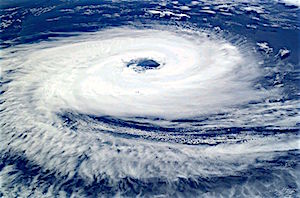New Japanese wind turbine works in Typhoons

Here’s a brilliant engineering solution to Japan’s current energy crisis. Following the Fukushima nuclear disaster, Japan’s nuclear energy program was derailed, requiring the importation of most of their electricity. The nation turned to renewables, like solar and wind, but despite an abundance of wind, conventional wind turbines would fail catastrophically during the country’s ubiquitous typhoons. We’ve certainly seen the shocking destructive power of typhoons and hurricanes recently, with the tragic loss of 800 lives in Haiti when hurricane Matthew, a category 4 storm, passed over the island.
If a wind turbine innovation could withstand a typhoon, an enormous energy source could be tapped. In fact, the total energy contained in a single Typhoon could power Japan for 50 years. Enter a forward-thinking engineer named Atsushi Shimizu, who accepted the challenge, and appears to have succeeded. His company, Challenergy, has developed a prototype for a typhoon-resistant wind turbine that can both withstand, and generate electricity during, a typhoon. The turbine is strongly built, looks a lot like an egg-beater, and utilizes the Magnus force of physics to control the turbine’s speed, preventing damage during extremely high winds. The current version of the device functions at 30% efficiency, compared to 40% for conventional turbines.
Shimuzu’s innovation has great potential. His wind turbine could usher in an era of nuclear-free energy independence for Japan, pulling the country out of the post-Fukushima slump. It could also extend the same benefits to other parts of the world buffetted by high winds and severe storms. It’s clear that continued research, experimentation, and development of alternative energy technologies is the way of the future, and will be of great benefit to humanity in a world increasingly threatened by anthropogenic climate change, and industrial pollution.
Learn more about Shimuzu’s Typhoon compatible wind turbine (CNN)
Photo: By Astronaut photograph ISS008-E-19646 was taken March 7, 2004, with a Kodak DCS760 digital camera equipped with an 50-mm lens, and is provided by the Earth Observations Laboratory, Johnson Space Center. – NASAThis is a retouched picture, which means that it has been digitally altered from its original version. Modifications: Increased contrast; decreased brightness; adjusted color balance in favor of blues and whites; removed large black splotches in several locations (and resized by faceactivities.com) Modifications made by Tomf688., Public Domain, Link

